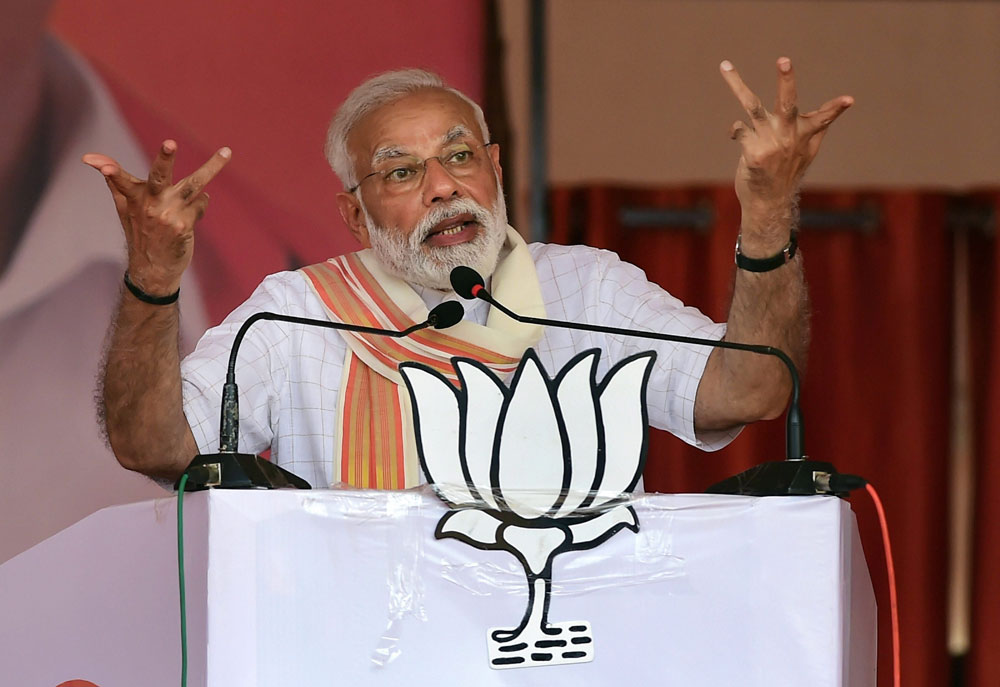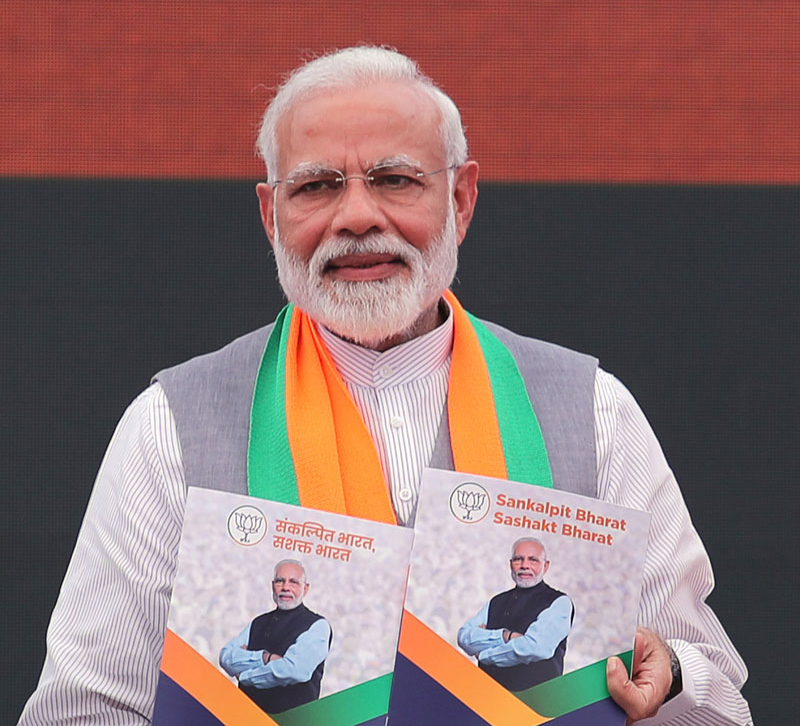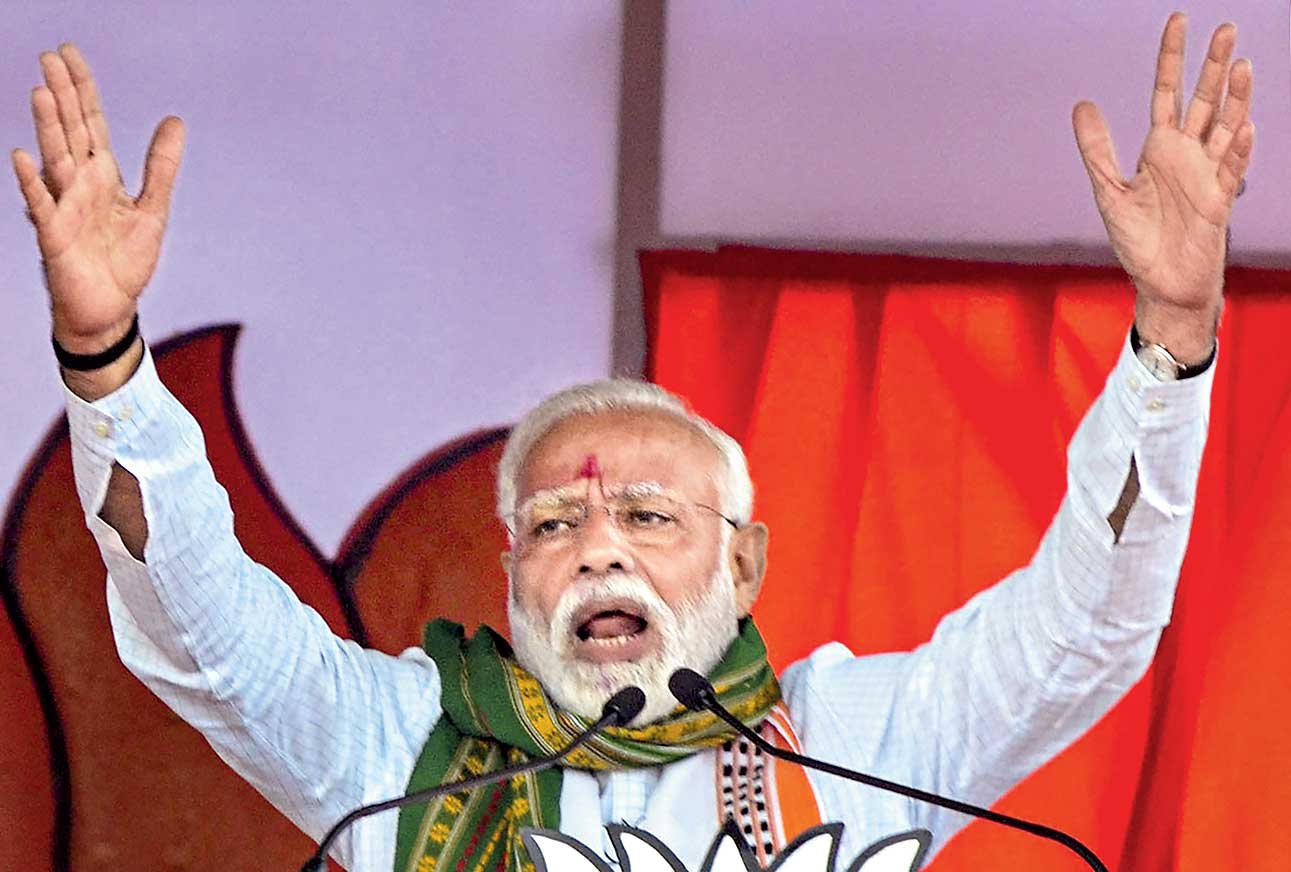Urban clusters in the immediate vicinity of the national capital are still singing the 2014 theme song: Modi, Modi, Modi…
Any random survey in the gated societies, the high-rise apartments in Noida or Greater Noida, which are part of the Gautam Budh Nagar Lok Sabha constituency, and Indirapuram or Vaishali in Ghaziabad shows that Prime Minister Narendra Modi will return to power.
If a bitter old man showers love on the RSS-BJP to nurse his Partition-inflicted wounds, a young professional believes only Modi can protect India from external and internal threats.
Many businessmen express extreme anger over demonetisation but concede it will be difficult to vote for the Samajwadi Party-Bahujan Samaj Party alliance or the Congress.
A jobless youth, Ramesh Gupta of Ghaziabad, sums up the mood of the Modi bhakts: “We are not judging him on the basis of work. Yes he has performed badly — businesses are down and there are no jobs. But the nation needs Modi.”
Asked why, he says with a giggle: “Musalman uchhalne lage Sapa-Baspa ke raj mein (Muslims feel emboldened in SP-BSP rule).”
In a posh Noida mall, six or seven of 10 people The Telegraph approaches flaunt their support for Modi. Even workers in a small factory, earning barely Rs 6,000 a month, point out that Modi was crucial to “maintaining India’s prestige in the world”.
Asked if their quality of life or earnings has improved in the past five years, none answer in the affirmative. One says: “The fear of terrorists has decreased.”
Another says: “Although I lost my job and got another after a year at a lesser salary, I support Modi because Rahul Gandhi isn’t good enough. He cannot speak like Modi.”
Asked why the majority of the people are supporting Modi in urban centres, Rajendra Yadav, a small realtor in Noida, explains: “It’s a false presumption. There is cut-throat competition this time.
“People don’t speak against Modi because they are condemned and branded anti-national. The silent voter is invisible while Modi bhakts are loud and willing to be counted. Also, the majority of Noida residents are settlers from outside — they speak English and live a cosy life. They don’t identify themselves with the local Jat-Gujjar population. BJP candidate Mahesh Sharma is a doctor who runs a big hospital chain and has created huge networks in the city.”
While Sharma doubtless commands overwhelming support in Noida, which has around five lakh voters, the electoral dynamics change radically in the other Assembly segments of Gautam Budh Nagar — Dadri, Jewar, Sikandrabad and Khurja — which have a combined voter count of over 13 lakh.
Outside Noida, the strength of the SP-BSP combine dominates the electoral discourse. Although voter apathy is striking — it is difficult to find a poster, hoarding or flags of any party in the rural areas — people open up slowly to accept that the voting pattern will be decided on the basis of caste.
In Bhatta-Parsaul, the village that shot to fame after Rahul Gandhi’s agitation there a few years ago, people openly say that no section of the society, including farmers, gained anything in the past five years. They express outrage at the very mention of “achchhe din” and complain that the sitting MP, Sharma, never came to them.
In many villages such as Dankaur, Salempur, Shahpur and Dadri, people express anger against the Modi government and assert they will vote for the “local” candidate.
The SP-BSP has fielded Satveer Nagar, a local Gujjar, while the Congress candidate is Arvind Singh Chauhan, a Rajput.
Arvind, highly educated professional, is seen as an outsider. His father Jaiveer Singh Chauhan is a BJP leader, which has further complicated his candidature. But people believe Arvind can slice away BJP votes, particularly by luring Rajput voters, and can also attract elite urban voters because of his profile.
In Ghaziabad too, where former army chief and Union minister V.K. Singh won the last election by over five lakh votes, the Congress has injected uncertainties by fielding a Brahmin candidate who is denting the BJP’s support base.
Although Congress candidate Dolly Sharma is not expected to win, there is a general impression that she is making deep inroads into the BJP’s upper caste, urban base.
SP-BSP candidate Suresh Bansal is not considered formidable enough to wrest the seat from the BJP on his own strength, but the Congress angle has brightened his prospects.
Singh’s popularity has nosedived because of the grudge that he remained inaccessible even to the towns, while he never visited the rural areas.
While Ghaziabad city and one Assembly segment — Shahibabad — with around 13 lakh votes are BJP strongholds, other areas like Loni, Muradnagar and Dholana are largely rural and angry with the BJP.
A BJP leader admitted a tough fight, saying: “We still have an edge but uncertainty in a constituency where we led by over five lakh votes tells a grim story.”













